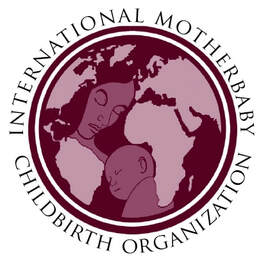International MotherBaby Childbirth Organization
VISION |
IMBCO and FIGO Created a NEW Global Initiative
IMBCO is one of the two founding organizations of the International Childbirth Initiative (ICI): 12 Steps to Safe and Respectful MotherBaby Maternity Care, launched in 2018 with the International Federation of Gynecology and Obstetrics (FIGO). IMBCO's primary focus is active participation in ICI implementation and the ongoing development and evaluation of the ICI 12 steps, and to advocate for and promote the global implementation of the ICI in birthing facilities and practices.
IMBCO'S goal is to promote and support the ICI Principles and 12 Steps to be adopted on a global scale, resulting in high quality, evidence-based, safe, and respectful care for all. The implementation of this initiative, which provides a template for optimal care, will always be in partnerships between those who access and those who provide the services, ensuring that good quality, culturally safe care will be achieved and will be sustainable according to local resources, while meeting the needs of the users and providers of maternity care.
The International MotherBaby Childbirth Initiative In Global Context
Significant progress has been made in maternal and infant health over recent decades, yet major problems remain in both developed and developing countries. More than half a million women die each year from problems in pregnancy and childbirth, mostly in developing regions, and many more suffer from complications of pregnancy and childbirth. The leading causes of maternal mortality include haemorrhage, sepsis, eclampsia, obstructed labour, unsafe abortion, and infectious diseases such as HIV/AIDS and malaria. The global infant mortality rate remains close to 1 in 10. Leading causes of neonatal and infant mortality include prematurity, low birthweight, birth asphyxia and injuries, infection, congenital birth defects, sudden infant death, respiratory distress, and gastro-intestinal diseases. However, most maternal and infant deaths are preventable through a combination of strategies that includes skilled attendance during childbirth from caregivers trained in facilitating the normal physiology of birth and breastfeeding, and access to emergency obstetric care.
The use of medical interventions in pregnancy, labour, and birth can be lifesaving. But when used inappropriately, medical interventions lead to avoidable complications, and cause harm and even death. Unnecessary overuse has resulted in a massive increase in health care costs, straining resources without improving birth outcomes. For example, caesarean rates in many countries far surpass the recommended upper limit of 15%. Lack of availability of caesarean section when needed costs lives, but its overuse carries serious potential short and long term harms for both mothers and infants.9 In addition, where intervention has become the norm, care providers are rarely trained in and/or able to retain and use the skills and knowledge required to support the normal physiology of labour and birth.
Optimal feeding practices—early and exclusive breastfeeding with appropriate complementary feeding— would prevent about 2 million infant deaths annually. Breastfeeding confers optimum nutrition, immune protection, development, and health for children and many health benefits to mothers.10 Improved breastfeeding alone could save the lives of more than 3500 children every day, more than any other preventive intervention. Medical interventions that disturb the normal physiology of labour, birth, and the immediate postpartum and newborn period can negatively affect the initiation, exclusivity and duration of breastfeeding, with direct impacts on survival and health.
The IMBCI acknowledges the great variation in resources and access to care around the world. The challenge for the 21st century is to increase access to skilled caregivers and emergency care where these are lacking while decreasing the overuse of unnecessary medical interventions, increasing understanding of normal birth and breastfeeding, and improving quality of care in all countries.
The use of medical interventions in pregnancy, labour, and birth can be lifesaving. But when used inappropriately, medical interventions lead to avoidable complications, and cause harm and even death. Unnecessary overuse has resulted in a massive increase in health care costs, straining resources without improving birth outcomes. For example, caesarean rates in many countries far surpass the recommended upper limit of 15%. Lack of availability of caesarean section when needed costs lives, but its overuse carries serious potential short and long term harms for both mothers and infants.9 In addition, where intervention has become the norm, care providers are rarely trained in and/or able to retain and use the skills and knowledge required to support the normal physiology of labour and birth.
Optimal feeding practices—early and exclusive breastfeeding with appropriate complementary feeding— would prevent about 2 million infant deaths annually. Breastfeeding confers optimum nutrition, immune protection, development, and health for children and many health benefits to mothers.10 Improved breastfeeding alone could save the lives of more than 3500 children every day, more than any other preventive intervention. Medical interventions that disturb the normal physiology of labour, birth, and the immediate postpartum and newborn period can negatively affect the initiation, exclusivity and duration of breastfeeding, with direct impacts on survival and health.
The IMBCI acknowledges the great variation in resources and access to care around the world. The challenge for the 21st century is to increase access to skilled caregivers and emergency care where these are lacking while decreasing the overuse of unnecessary medical interventions, increasing understanding of normal birth and breastfeeding, and improving quality of care in all countries.

